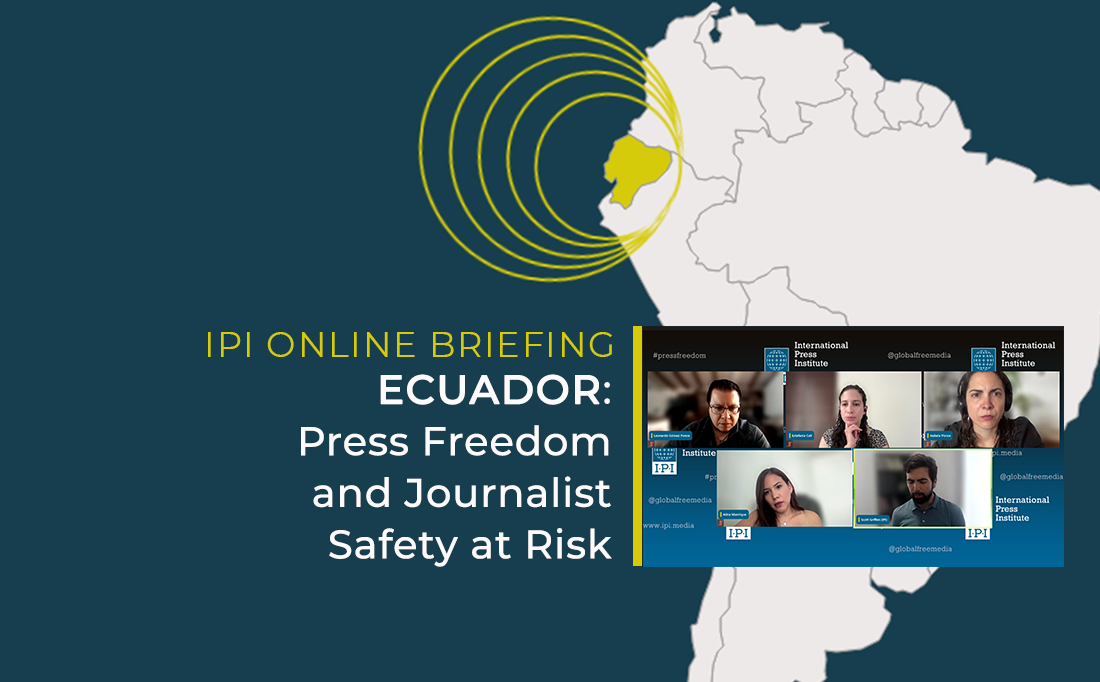Earlier this year, masked men armed with guns and explosives stormed the set of Ecuador’s TC Televisión during a live broadcast – a shocking event that put into sharp focus the unfolding journalist safety crisis in Ecuador.
While press freedom challenges are not new in Ecuador, a surge of organized crime and drug-related violence starting last year has shattered journalists’ sense of security and increasingly put their safety at risk.
The government of President Daniel Noboa is under pressure to curb the violence, and has resorted to increasingly drastic measures to do so. But Noboa’s heavy hand is also raising fears about press freedom, including after the government reportedly pushed for the closure of a critical TV program.
The upshot of these developments is a growing atmosphere of fear, self-censorship, and, increasingly, journalists leaving the country for exile.
This webinar with leading Ecuadorean journalists and editors aims to shed light on Ecuador’s spiraling journalist safety crisis amid these dramatic political and security-related developments – and assess the needs of the country’s journalists and how the international community can address them.
Speakers:
- Estefanía Celi, journalist and member, Periodistas sin Cadenas
- Leonardo Gómez Ponce, Tierra de Nadie
- Alina Manrique, Editor-in-Chief at TC Televisión
- Isabela Ponce, co-founder and chief editorial officer, GK
Moderator: Scott Griffen, Interim Executive Director, IPI
Speaker bios
Estefanía Celi is an Ecuadorian journalist, covering politics, elections and corruption. She is also a member of Fundación Periodistas Sin Cadenas, an Ecuadorian NGO that monitors how journalism is being done in the country. She actually works for the digital media outlet Primicias, and previously collaborated with El Comercio, Diario Hoy and Ecuavisa. She won the Eugenio Espejo Award in investigative journalism in 2021, and was a finalist for Premio Gabo 2019 as a part of a big collaborative journalism team in Ecuador and Colombia. She was a research and data fellow for OCCRP in 2023.
Leonardo Gómez Ponce is an Ecuadorian journalist specialized in economic investigation and fiscal oversight, with expertise in public procurement, mining, and tracking criminal economies. Trained in data journalism, disinformation analysis, and solutions journalism. Director of the investigative journalism unit Tierra de Nadie, a project focused on investigating local powers in non-capital cities.
Alina Manrique is an Ecuadorian reporter and editor with 20 years of experience. She is the Editor-in-Chief at TC Televisión and member of Connectas Hub for Ecuador, as well as a reporter of Indómita and other international media outlets. Manrique was a reporter for El Universo, Expreso, El Telégrafo and Vistazo. From 2011 to 2016 she was in charge of the digital content of Ecuavisa. Finalist for the Jorge Mantilla Ortega Awards (2020) and Honorable Mention in the Eugenio Espejo Awards (2022), her work was also included in the long list of the One World Media Awards (2024). She is a professor of Journalism and Communication at several universities in Guayaquil.
Isabela Ponce is the co-founder and chief editorial officer at GK, an independent media outlet based in Ecuador. She is an entrepreneurial journalist and holds the distinction of being the only Ecuadorian journalist to have won the Ortega and Gasset prize of Diario El País. She combines her work at GK—which not only focuses on editorial strategies but also on generating new sources of income— with consultancies to journalists and media in different countries in Latin America. She is one of media viability ambassadors of DW Akademie. Before GK, she has worked for El Telégrafo, Vistazo, El Comercio, and La República (Peru) newspapers. Her journalistic work focuses on women and girls’ rights, and the environment.
[content_boxes settings_lvl=”child” layout=”clean-horizontal” columns=”1″ icon_align=”left” title_size=”18″ title_color=”” body_color=”” backgroundcolor=”#d5cb0b” icon_circle=”” icon_circle_radius=”” iconcolor=”#d5cb0b” circlecolor=”#d5cb0b” circlebordercolor=”#d5cb0b” circlebordersize=”” outercirclebordercolor=”#d5cb0b” outercirclebordersize=”” icon_size=”” icon_hover_type=”” hover_accent_color=”” link_type=”” link_area=”” link_target=”” animation_delay=”” animation_offset=”” animation_type=”0″ animation_direction=”down” animation_speed=”0.1″ margin_top=”0″ margin_bottom=”0″ class=”” id=””][content_box title=”IPI ONLINE BRIEFING” icon=”” backgroundcolor=”#d5cb0b” iconcolor=”#000000″ circlecolor=”#d5cb0b” circlebordercolor=”” circlebordersize=”” outercirclebordercolor=”” outercirclebordersize=”” iconrotate=”” iconspin=”no” image=”” image_width=”35″ image_height=”35″ link=”” linktext=”” link_target=”_self” animation_type=”0″ animation_direction=”down” animation_speed=”0.1″]
[checklist icon=”fa-calendar” iconcolor=”#000000″ circle=”no” circlecolor=”” size=”17px” class=”” id=””]
[li_item icon=”fa-calendar”] Date: Tuesday, July 23[/li_item]
[li_item icon=”fa fa-clock-o”] Time: 16:00 CEST (Central European Summer Time)[/li_item]
[li_item icon=”fa fa-language”] Language: English.[/li_item]
[li_item icon=”fa fa-ticket”]Registration required.[/li_item]
[/checklist]
[/content_box][/content_boxes]
